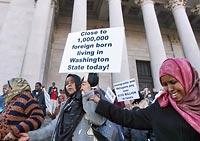Native cultures, newfound politics mix

OLYMPIA — At the foot of the state Capitol, four women decked in chartreuse and coral gowns lobbied their legislators by shifting their hips and twirling their wrists to the rhythm of a Turkish tune.
The tactic was unconventional by Olympia standards, but for many at the first Refugee and Immigrant Legislative Day, traditional costumes, dances and songs were more familiar than the colossal dome above them and the vociferous speeches of activists.
"Coming to the Capitol is very intimidating," said Assunta Ng, publisher of Northwest Asian Weekly. "In your native country when you go to the Capitol, it's like you're in trouble."
Many of the estimated 800 immigrants and refugees who came to Olympia on Tuesday once lived under dictatorial regimes and are still apprehensive about political participation, Ng said.
At the Legislature, far from their former homes in Somalia, Russia, China, Vietnam and elsewhere, they asked leaders to increase funding for job training and English programs for non-native speakers, and to adjust the state's standardized test to fit immigrants' needs.
After the rally, some participants met individually with lawmakers.
The Washington Assessment of Student Learning (WASL), which high-school students must pass in order to graduate, was one of their top concerns.
"I tried to take the WASL last year and it was pretty hard for me," said 18-year-old Ali Hussein, who left Kenya more than two years ago.
Though he has mastered English and impressed his teachers at Everett High School, he failed every section of the WASL and is nervous about his retake this spring.
Teena Ellison, a family-services coordinator for the Everett Housing Authority, said immigrants don't have a fair shot at the WASL because the questions are geared toward those who had an American upbringing.
Maggie Sung of the Refugee Women's Alliance, which helped sponsor the event, wants lawmakers to address adult education as well.
"The people who are here have a lot of potential energies," said Sung, adding, they "just need a catalyst."
Advocates from the Refugee Women's Alliance said an extra $3 million for the LEP Pathway, a job-training and placement program that includes English instruction, would help immigrants and refugees find jobs and become self-sufficient.
To lobby for that funding, many held signs and gave speeches honoring the contributions of foreign-born Americans.
"This country was built by immigrants and refugees," said Tony Lee, advocacy department director for Solid Ground, the social-services organization formerly called Fremont Public Association.
According to the Refugee Women's Alliance, Washington ranks in the top 10 of states with the most immigrants and the most refugees. About 12 percent of the state's residents were born abroad.
"We are sending a strong message that we want to have more say in our lives, that we are deserving and entitled to equal access to opportunities, that we are more than the color of our skin, our country of origin or a number in the census data," said alliance Executive Director Someireh Amirfaiz.
Elliott Wilson: 360-236-8169 or ewilson@seattletimes.com


